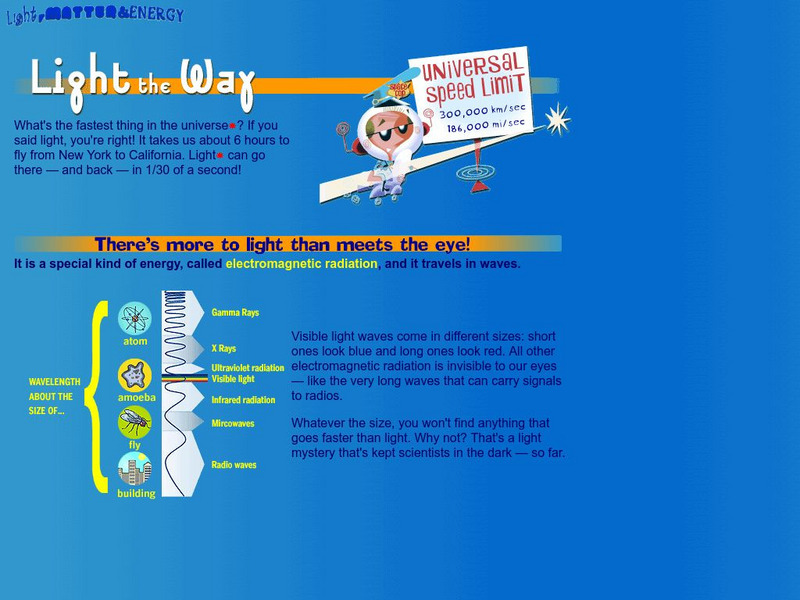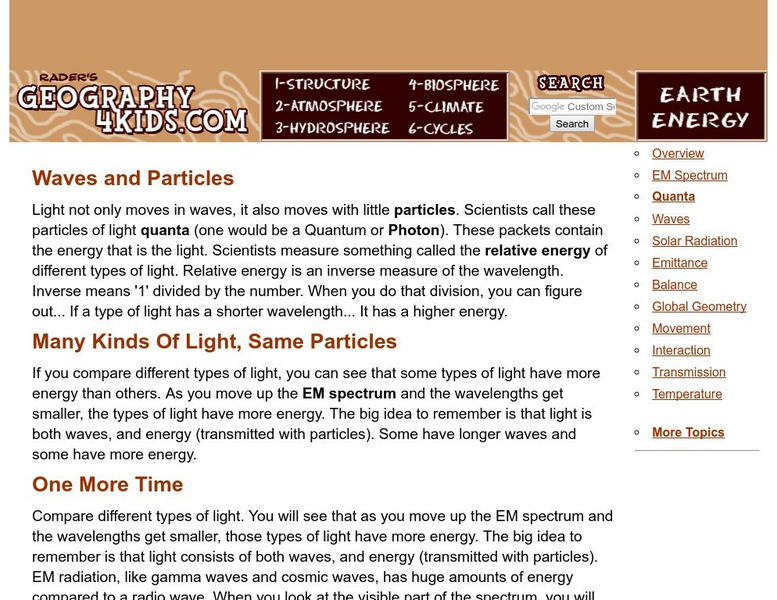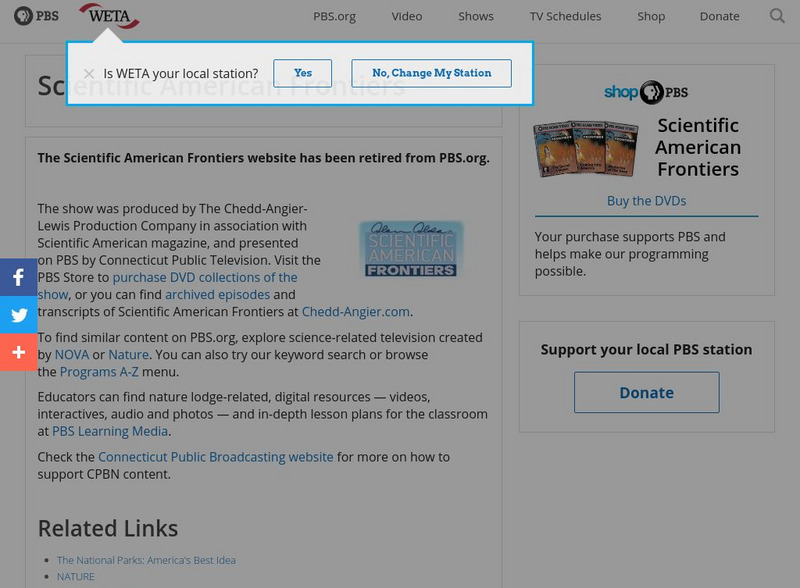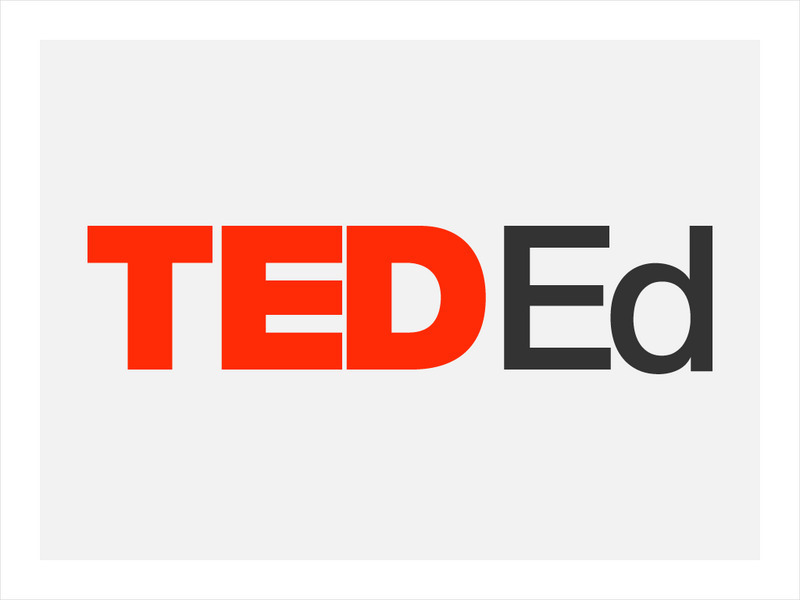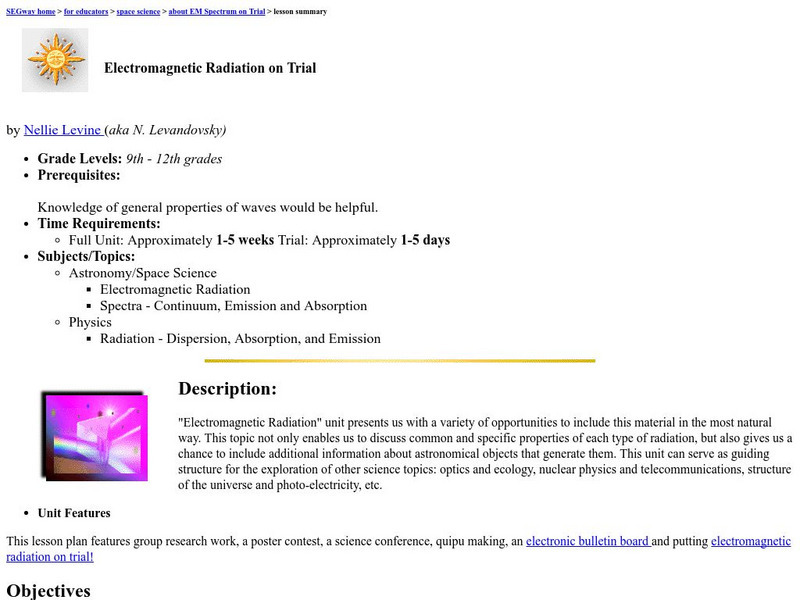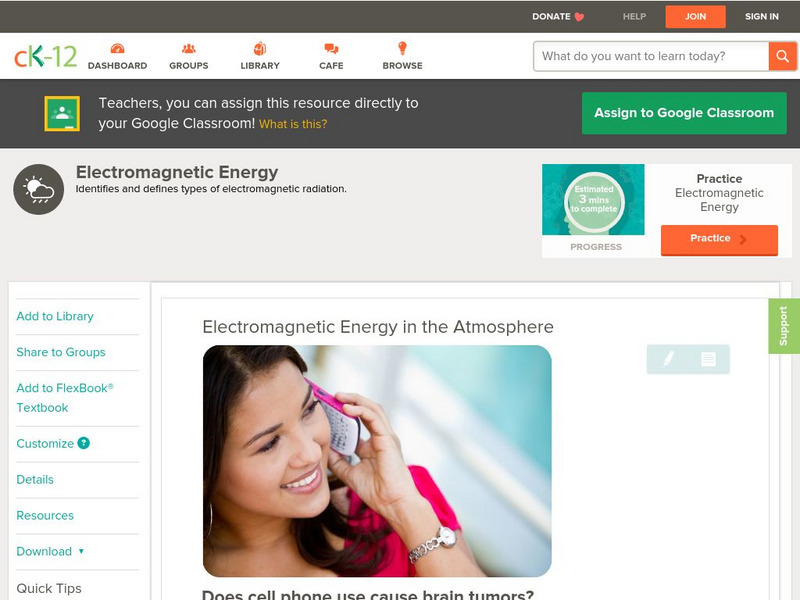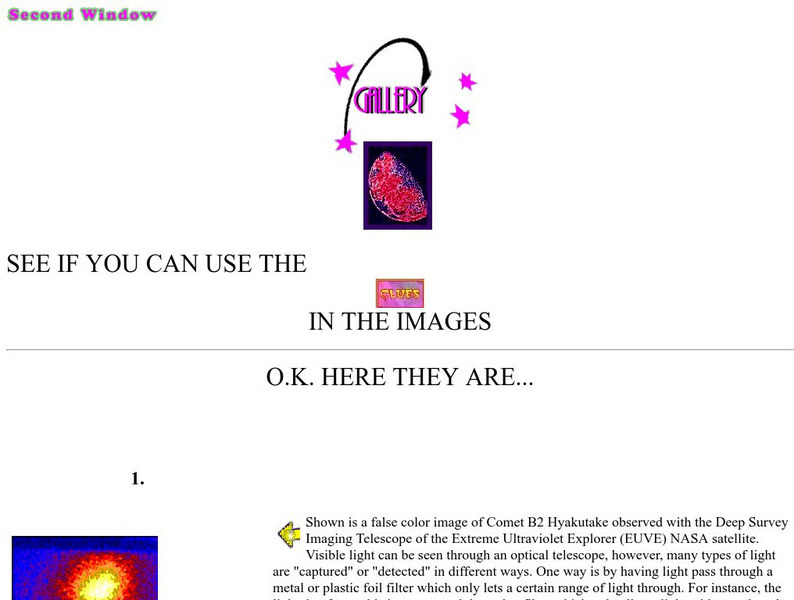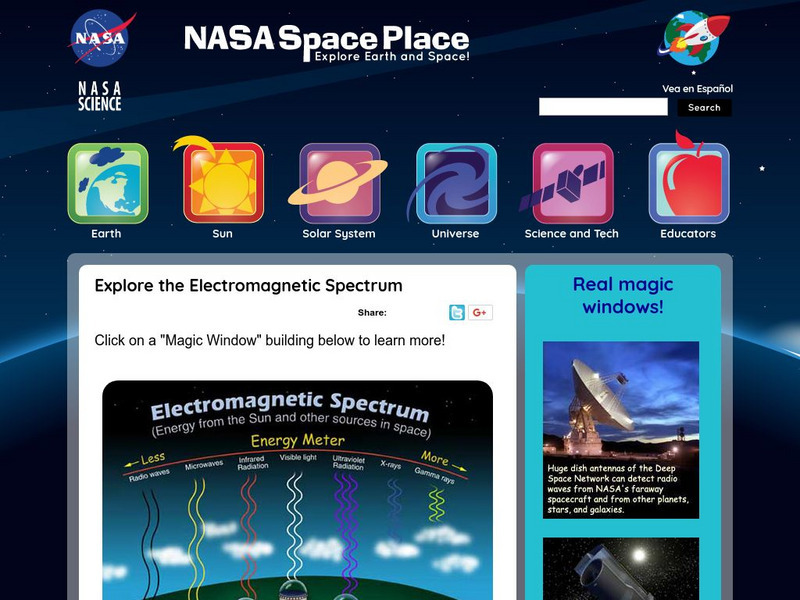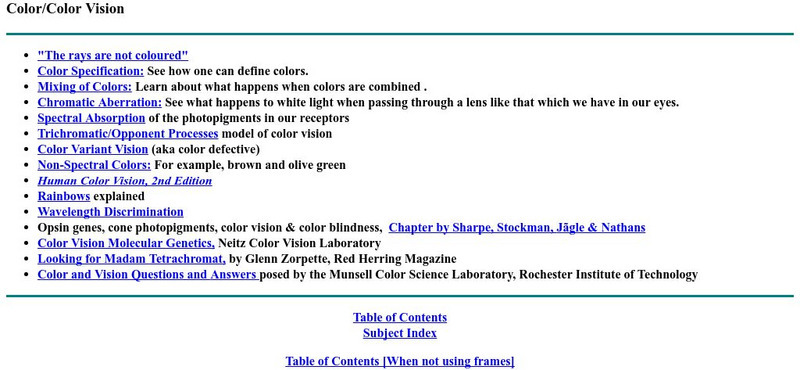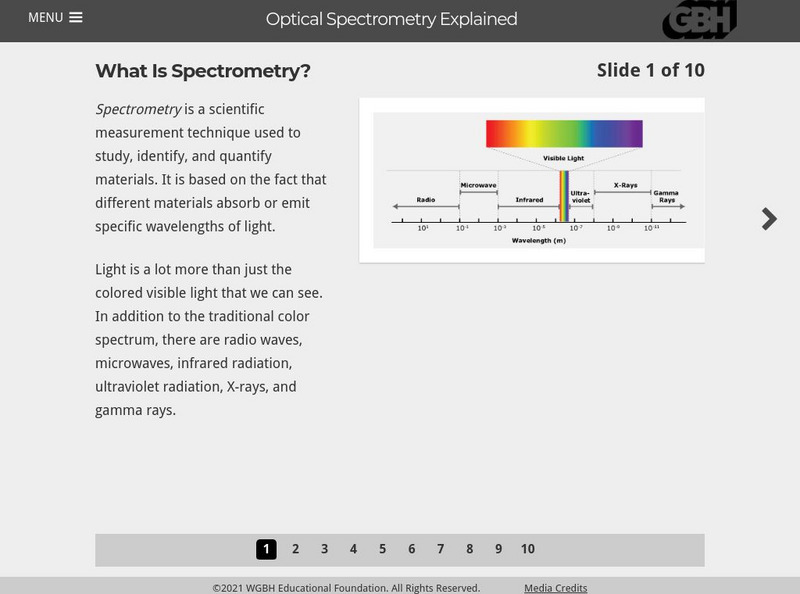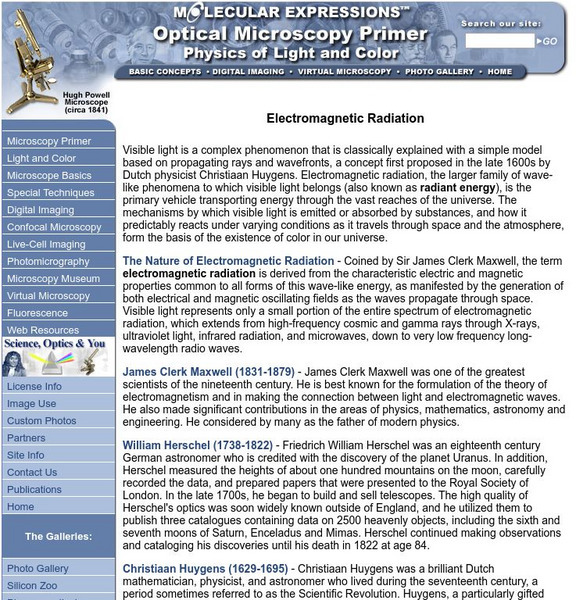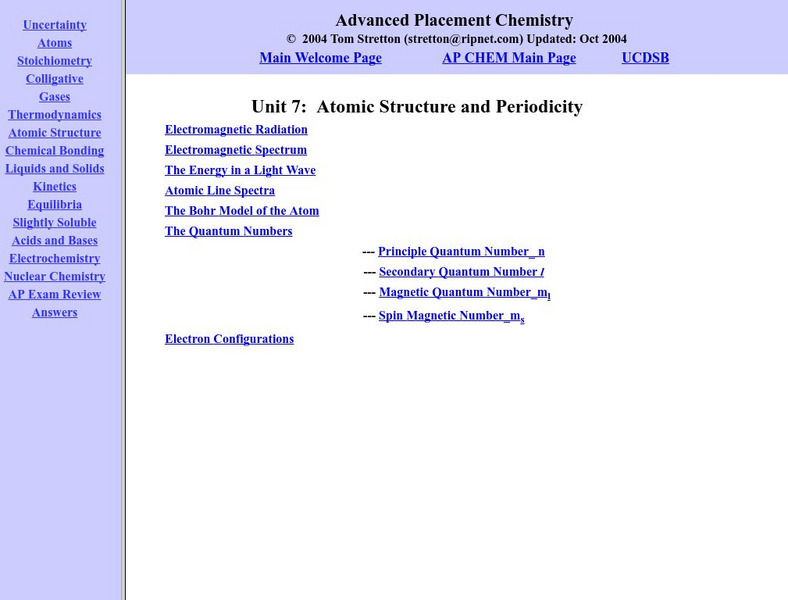Sophia Learning
Sophia: Light Waves: Lesson 1
This lesson will introduce light waves and describe how a particle can travel as a photon or a wave. It is 1 of 4 in the series titled "Light Waves."
Sophia Learning
Sophia: Light Waves: Lesson 3
This lesson will introduce light waves and describe how a particle can travel as a photon or a wave. It is 3 of 4 in the series titled "Light Waves."
American Museum of Natural History
American Museum of Natural History: O Logy: Light, Matter, Energy: Light the Way
What is electromagnetic radiation and how does it work? Review a captioned graphic that explains electromagnetic radiation and the visible and invisible types of radiation on the electromagnetic spectrum.
Science Struck
Science Struck: Wavelength of Light
Describes the characteristics of light, presents two formulas for calculating its wavelength, and provides a table of the different wavelength ranges across the electromagnetic spectrum.
Khan Academy
Khan Academy: Light: Electromagnetic Waves, Electromagnetic Spectrum and Photons
This article discusses the properties of electromagnetic radiation and photons.
Geography 4 kids
Geography4 kids.com: Waves and Particles
Understand how light moves in small particles in the electomagntic spectrum.
Georgia State University
Georgia State University: Hyper Physics: Scattering Concepts
A collection of several pages explaining the principles which underlie Rayleigh scattering of light.
NASA
Nasa: The Space Place: Why Is the Sky Blue?
Learn about colors of light by exploring how prisms work. Discover the different colors of the spectrum and how the visible light is what we see.
Physics Aviary
Physics Aviary: Em Spectrum Lab
This lab is designed to allow students to look at the factors affecting the location of different colors formed by diffraction grating.
University of Colorado
University of Colorado: Physics 2000: Cat Scans: Projecting Shadows
This page and the three pages which follow discuss how X-ray technology can be used to produce an image of the human body. Discussion is understandable and highly intriguing. Several interactive animations allow the visitor to explore...
PBS
Pbs Teachers: Life's Big Questions: How Did the Universe Begin?
Investigate the Big Bang Theory of the origin of the universe by researching the light spectrum and the actions of light waves. Create models that illustrate red shift in a moving star and the expansion of the universe.
TED Talks
Ted: Ted Ed: What Is Color?
Colm Kelleher describes the physics behind colors- why the colors we see are related to the period of motion and the frequency of waves. [3:09]
University of California
Center Science Edu.: Electromagnetic Radiation on Trial
Here is a 1-5 day unit on electromagnetic radiation that features a teacher guide and student activities with extensions.
University of California
U.c. Berkeley: Spectra From Space
View the entire spectrum of electromagnetic radiation and get information on telescopes especially designed to view different wavelengths of the spectrum.
University of Colorado
University of Colorado: Physics 2000: Einstein's Legacy: Microwave Ovens
A series of pages that explain how microwave radiation is utilized by ovens to cook food. Includes several Java applets.
CK-12 Foundation
Ck 12: Earth Science: Electromagnetic Energy in the Atmosphere
[Free Registration/Login may be required to access all resource tools.] Overview of electromagnetic radiation.
University of California
Center for Science Education: Gallery
A gallery of astronomy images which depict galaxies, comets, the moon, planets, nebulae, supernovae as seen in various regions of the electromagnetic spectrum. Each image in the gallery is described. Fascinating!
NASA
Nasa's the Space Place: A Trip to the Land of the Magic Windows
Explore the electromagnetic spectrum and learn about each type of energy on the spectrum.
York University
York University: Color and Color Vision
York University provides an index page to several other pages on the topic of color and color vision. The pages are part of an online "book." Many graphics and explanations.
PBS
Pbs Learning Media: Spectrometry Explained
This interactive tutorial illustrates how spectrometry is used to study, identify, and quantify materials.
Florida State University
Florida State University: Molecular Expressions: Electromagnetic Radiation
This Florida State University page introduces light as an electromagnetic wave and discusses the frequency and wavelength range of the various regions of the electromagnetic spectrum. Includes links to some interactive Java applets.
Trinity College Dublin
The History of Mathematics: Young
A short sketch of the life and work of Thomas Young (1773-1829 CE). Traces early upbringing and education and his scientific discoveries and contributions.
NASA
Nasa: The Space Place: The Land of the Magic Windows
This is a site from NASA that contains an interesting and fun way to learn about the electromagnetic spectrum. Kate receives a strange riddle from her grandfather. Find out what it says and go through the gateway to the Land of the Magic...
Upper Canada District School Board
Tom Stretton's Advanced Placement Chemistry: Atomic Structure and Periodicity
This chemistry e-textbook provides students with AP-level reading and practice material on atomic structure and periodicity.




